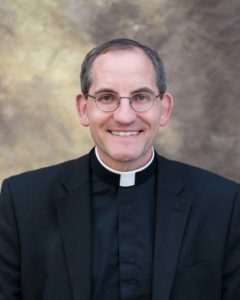
For the past month, our 10 am Sunday Mass has been celebrated ad orientem, which means “toward the East.” In his column for the December 13, 2020 edition of the Catholic Times, Bishop Paprocki did a great job of explaining the theology of symbolism of celebrating Mass this way. I want to highlight one line from his column that will be important for my reflection today. Bishop Paprocki wrote:
While celebrating Mass facing the people became popular after the Second Vatican Council, there is actually no document from the Second Vatican Council that calls for Mass to be celebrated facing the people.
This point highlights a device that is often employed to justify changes in recent decades. People point to the Second Vatican Council as making changes that it did not actually call for. For example, you may hear people saying that the Council did away with meatless Fridays outside of Lent. The fact of the matter is, that still remains the expectation in the Universal Church, though here in the United States, permission has been granted to replace abstinence from meat on Friday with some other penitential practice.
Another discipline that people sometimes credit the Council for removing is the fast required before receiving the Eucharist. I have heard countless stories of people who acknowledged how difficult it was to fast from midnight on before receiving Holy Communion the following morning. In 1957, the fast was shortened to three hours, and in 1964, Pope St. Paul VI shortened the fast further to be just one hour, and now we have the following that remains the current law: “One who is to receive the Most Holy Eucharist is to abstain from any food or drink, with the exception of water and medicine, for at least the period of one hour before Holy Communion.” (Code of Canon Law, can. 919)
I find it a little surprising that many people are unaware of the Eucharistic fast, either having never heard that it ever existed, or that it is a practice that has been abandoned, done away with by the Second Vatican Council. In one of his writings early in his pontificate, Pope St. John Paul II reflected on how the faithful can become lax in their being properly disposed to receive the Eucharist, which includes observing the Eucharistic fast. He writes the following:
In fact, what one finds most often is not so much a feeling of unworthiness as a certain lack of interior willingness, if one may use this expression, a lack of Eucharistic ‘hunger’ and ‘thirst,’ which is also a sign of lack of adequate sensitivity towards the great sacrament of love and a lack of understanding of its nature.
May we all take this opportunity to examine how much we hunger and thirst for the Eucharist, expressed very tangibly in how we observe the Eucharistic fast, short as it may be, but necessary for our worthy and fruitful reception of this great gift.
Father Alford